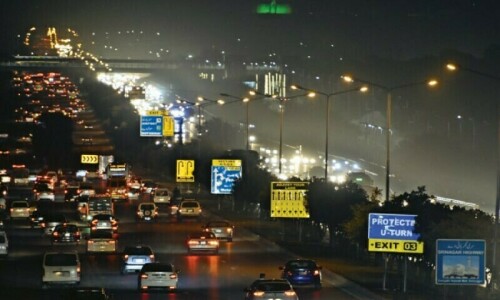ISLAMABAD: The ruling PML-N’s decision not to use excessive force against the Pakistan Tehreek-i-Insaf (PTI) and Pakistan Awami Tehreek (PAT) protesters that camped out outside the parliament for over three months was generally considered one of the government’s saving graces during that crisis.
But it seems that now, the same government is looking to axe the officer who advocated the policy of restraint and doubtlessly saved many innocent lives, because he did not crackdown on protesters.
Mohammad Ali Nekokara, who was the senior superintendent of police (SSP) responsible for operations at the time, has passionately argued against using force against the marchers. But now, official sources say, the Establishment Division has completed an inquiry against him over charges of disobeying a senior officer, an offence that is punishable by removal from service.
In the last week of August 2014, when PAT and PTI announced they will march on Parliament House, the interior ministry under Chaudhry Nisar Ali Khan was seriously discussing whether to stop Imran Khan and Dr Tahirul Qadri by force or let them march into the high-security zone.
As one of the officers responsible for operations on the ground, Mr Nekokara wrote a detailed letter to Interior Secretary Shahid Khan on Aug 26, emphasising the importance of not using force.
In his correspondence, the SSP mentioned the Model Town incident, where the unnecessary use of force had led to the deaths of more than a dozen innocent people in Lahore and created grave problems for the provincial government.
Mr Nekokara made his case on the basis “that the use of force on a crowd of more than 30,000, including women and children, by a loosely integrated force consisting of police units from Punjab police, AJK police and Railways police in addition to Rangers and Levies and Islamabad police, entailed serious risk of misuse of authority and disproportionate force”.
But in a twist of fate, Mr Nekokara was also nominated in the FIRs lodged by PTI and PAT over the use of force against protesters on the night of Aug 30, when both parties decided to move towards Prime Minister House.
Sources told Dawn that after that eventful night, there were still a few among government circles who believed that the protesters should be forcefully evicted and both leaders’ container be moved from D-Chowk. Yet again, SSP Nekokara opposed the idea and soon after, was asked to report to the Establishment Division in the first week of September. Subsequently, an inquiry was initiated against him in November, the main charge being refusal to obey an order from his seniors.
Other charges levelled against the police officer included misrepresentation of facts, refusal to use force, leaking information to the media, causing the demoralisation of the police force under his command and miscalculations on the impact of the use of force.
Sources in the Establishment Division said that the inquiry officer, Inspector General of Police (IGP) Balochistan Mohammad Amlish had completed the inquiry against Mr Nekokara and found him guilty of the charges framed.
Foreign Secretary Aizaz Chaudhry, who was the authorised officer in this case, is also said to have endorsed the report’s recommendations. The SSP, a grade 19 officer, also had a personal hearing with Establishment Division Secretary Nadeem Hassan Asif – a final official formality following which his dismissal could be announced at any time.
Sources in the Establishment Division also indicated that the inquiry officer, IGP Amlish, is eyeing the position of IGP Punjab and has readily complied with what the government has asked; that SSP Nekokara be taught a lesson.
Commenting on the development, a serving federal secretary told Dawn that it was excessive of the government to dismiss an officer just because he had presented his point of view under certain circumstances.
“When a situation arose on Aug 30, the same officer stopped PAT and PTI marchers from reaching PM House. This is how officers on the ground should act,” he said.
The government officer maintained that if the government went ahead with its decision to remove SSP Nekokara, it would be in violation of a recent Supreme Court verdict in the Anita Turab case, where the court had ruled, “It is not in contention that civil servants are public servants and are, therefore, meant to take decisions only in accordance with law in the public interest. In their capacity as advisers in decision-making or as administrators and enforcers of law, they are not subservient to the political executive. It is their obligation to remain compliant with the Constitution and law. Hence they are not obliged to be servile or unthinkingly submissive to the political executive.”
Establishment Division Secretary Nadeem Hassan Asif was not available for comment.
Published in Dawn March 19th , 2015
On a mobile phone? Get the Dawn Mobile App: Apple Store | Google Play















































Dear visitor, the comments section is undergoing an overhaul and will return soon.